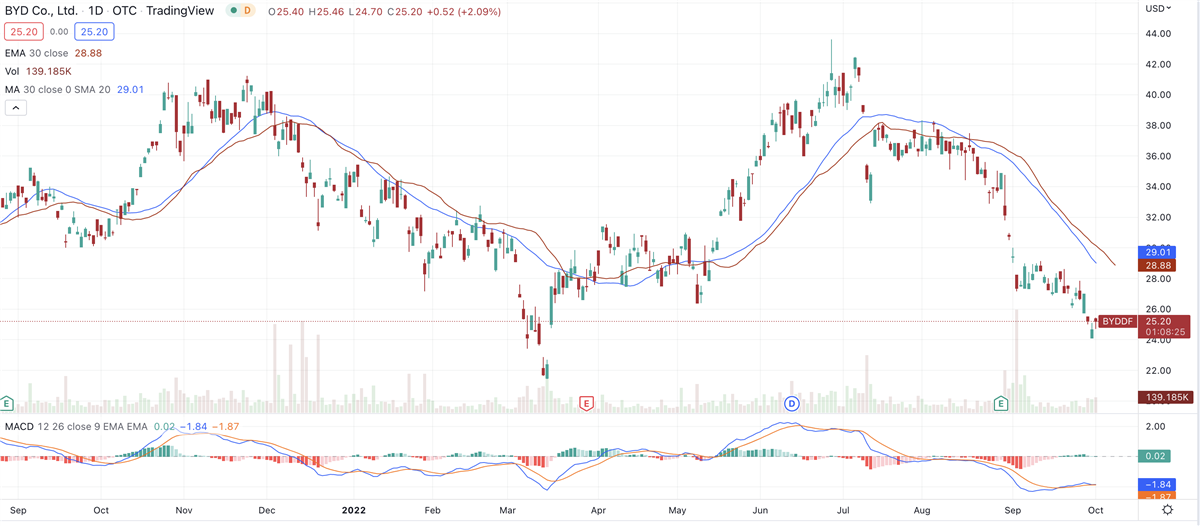
When Americans are out and about and see electric vehicles, it’s common to see those made by Tesla (NASDAQ: TSLA) or every once in a great while, Rivian (NASDAQ: RIVN). Meanwhile, legacy automakers like Ford (NYSE: F) and General Motors (NYSE: GM) are rolling out their own versions of electric vehicles.
Amid all the activity by U.S.-based automakers, Chinese EV maker BYD (OTCMARKETS: BYDDF) has aspirations to be a global company, not limited to its current outsized market share in its home country. Its vehicle offerings include hybrids and those powered entirely by electricity.
On Monday, the company said third-quarter vehicle sales almost tripled. It’s introducing new models, such as the Seal, for which it (along with analysts) has high hopes. Wall Street expects BYD to earn $0.46 per share for the full year. That would be a 171% gain over 2021. Next year, that’s seen rising another 74% to $0.80 per share.
While the U.S. market is still in its sights, BYD is expanding into Europe. Last week, the company hosted an event in the Netherlands where it revealed three EVs available for sale starting this quarter. It introduced its Tang EV in Norway in 2020, but is adding other markets. It recently began shipping EVs to India, New Zealand and Australia, with plans to expand further in Asia, including into Japan.
If that weren’t enough, the company also has a battery-production partnership with Tesla.
BYD has been making cars in China for over two decades but is gradually shifting to take a dominant position in the EV market. While it may be largely unknown in the U.S., those in the know have long been aware of BYD’s growth. Warren Buffett’s Berkshire Hathaway (NYSE: BRK.A) holds a significant chunk of BYD shares,
Shares of BYD were up 2.53% in heavy trading volume Monday following news of the quarterly sales. The company has not yet reported quarterly earnings.
The company has notched a stellar history of sales growth recently, with revenue increasing between 24% and 153% in the past eight quarters. Its three-year sales growth rate is 37%.
Earnings grew at triple-digit rates over the past three quarters, and the company has a long history of profitability. The three-year earnings growth rate is a more-than-healthy 36%.
Nonetheless, given market conditions, the stock has been in a slump this year, with the following returns:
- 1 month: -19.60%
- 3 months: -38.62%
- Year-to-date: -27.24%
Analysts have confidence in the stock, though.
According to MarketBeat analyst data, Wall Street has a “buy” rating on the stock. In September Barclays initiated coverage with a rating of “overweight.”
Analyst coverage remains scant, despite a market capitalization of $68.75 billion. That’s because the stock is traded over the counter, rather than being listed on a major exchange as an American Depositary Receipt, as many overseas companies are.
BYD’s uptick came on a day when Tesla skidded more than 8% after saying its third-quarter vehicle deliveries came in below views.
Other EV makers, such as China’s XPeng (NYSE: XPEV) and Nio (NYSE: NIO) were trading lower Monday, while Li Auto (NASDAQ: LI) was moving to the upside.
Li reported third-quarter vehicle sales Friday, with totals for hybrid and all-electric vehicles coming in ahead of guidance (which has previously been lowered), and that it was moving up the launches of two new models.
Nio’s quarterly vehicle sales were up a whopping 29.3% year-over-year, while XPeng’s came in 15% higher.
Electric vehicles are clearly companies that could be considered in the “high growth potential” category. That’s especially true of the Chinese manufacturers and Tesla, although there are laggards, such as Rivian, which analysts don’t expect to be profitable any time soon.
It’s very tempting to jump into a high-growth industry like this, but evaluate carefully how each stock is doing, what markets it’s entering and how Wall Street views the company’s future prospects.













